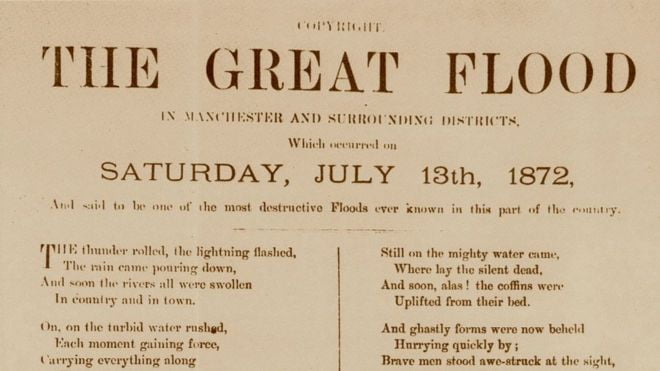
Spreading the news in the 19th Century was often conducted in the medium of song. “Broadside ballads” would be sonorously bellowed on street corners, keeping folk abreast of what was going on in the region.
The ballads, printed on large sheets of cheap paper, were often illustrated with woodcuts and a helpful indication of which well-known tune would fit the words. They would be sold to punters who would then go and sing the news elsewhere.
They bore news, prophecies, histories, moral advice, religious warnings, political arguments, satire, comedy and bawdy tales and sold in large numbers on street corners, in town squares and at fairs where they were performed by travelling ballad singers.
Pinned on the walls of alehouses and other public places, they were sung individually by ballad mongers, but were also popular at group singsongs – trilled at work by apprentice and master, harmonised in the fields by milkmaids and farmers.
“There was no telly, there was no radio, and we were even five years off the publication of the first Manchester Guardian,” says radio presenter Mark Radcliffe, who has travelled around his native Lancashire to make a film for Inside Out North West about the ballads.
“But there was a kind of social media back in the 19th Century – they just didn’t call it that.”
The subjects covered by the broadsides were wide-ranging, from the Peterloo Massacre and Manchester’s Great Flood of 1872 to light-hearted ditties about henpecked spouses and gossipy songs about extramarital affairs.
The themes speak of struggle (The Spinners Lamentation, 1846), poverty (Tinkers Garden, 1837), civic uprisings (The Meeting at Peterloo, 1819) and communal tragedy (The Great Flood, 1872). However, they also recall good nights out (Victoria Bridge on a Saturday Night 1861) and day trips around the region (Johnny Green’s Trip fro’ Owdhum to see the Manchester Railway, 1832).
“They really are a slice of real life and social history from 19th Century Manchester,” says Radcliffe.
“Looking through them, well it’s a cliché, but all of human life is here.
“There’s stuff about Peterloo there for a start, but there are tales of murders, executions, industrial action, prostitution, excessive drinking, deaths of the famous and even ballooning for some reason.”

The Great Flood – selected verses
The thunder rolled, the lightning flashed,
The rain came pouring down,
And soon the rivers were swollen
In country and in town.
Still on the mighty water came
Where lay the silent dead
And soon alas! the coffins were
Uplifted from their bed.
Ghastly forms of old and young
Lay open to our view;
God grant that such appalling sights
May ne’er be seen by you.
Nor yet unmindful would we be,
Of those who suffered loss,
But grateful that from harm we’re free.
Help them to bear their cross.

Because the broadsides were printed on low-quality paper and their nature was ephemeral – just a thin sheet – many did not survive. They would be pasted on top of each other on a wall, or pinned above a fireplace.

However, some people, including the diarist Samuel Pepys, made a habit of collecting them.
Jennifer Reid, an expert in Lancashire folk traditions, discovered the Manchester broadsides when she volunteered at the city’s Chetham’s Library. She now sings them herself at folk shows – often accompanied by a clog dance.
“Back in the day you’d buy the broadside from a hawker in the street,” she said. “He’d sing them – all apart from the last verse that is, so they didn’t give away the end of the story. They weren’t daft.”
“It’s all the themes you can think of that affect us now,” says Ms Reid.
Manchester Library has several thousand ballad sheets dating from the 1600s to the end of the 19th Century, says the library’s head of music Ros Edwards.
“They are a wonderful social record of what happened over those years. Terrible sorts of things – all sorts of events. Political events, international events even, as well as local events. ”
Broadsides began to decline in popularity when they could not keep up with other, newer, forms of cheap print. Chapbooks – small booklets, inexpensive to make and to buy – became fashionable as literacy increased, and the invention of the telegraph led to a demand for up-to-date accurate news rather than long rhyming tales sung in the streets.
[Source:-BBC



